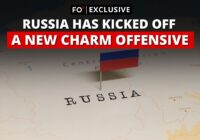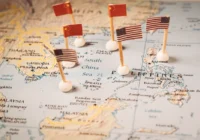Time magazine and its Associated Press source both appear somewhat befuddled by the remarks of Russian Foreign Minister Sergei Lavrov when he claimed at the UN General Assembly that “it is hard for the West to accept seeing its centuries-long dominance in world affairs diminishing.” While the authors of the article don’t deny the possible truth of Lavrov’s thesis, they cite it with a tone of patronizing dismissal that becomes evident at the end of this very brief news brief (it runs a mere five paragraphs).
The very first sentence not so subtly identifies Russia as the enemy in its choice of language. It does this implicitly by comparing Lavrov to a rooftop sniper in a war zone: “Russia’s foreign minister is taking aim at the West, saying its philosophies are out of step with the times.” Though it pays lip service to the notion of thoughtful analysis (“philosophy”), the authors present it as an act of physical aggression against an entire civilization.
The idea of monopoly, a virtual synonym for empire, has become so embedded in many people’s minds as the key to order and efficiency that it would be a shock for them to consider any kind of multipolar organization of the world’s affairs. Most people in the West feel that monopoly or a strict hierarchy of power that tends toward empire (though they prefer to avoid using the term) are synonymous with order. Anything else will tend toward chaos.
Lavrov developed his thought when he added this more focused political observation: that some countries in the West “are trying to impede the development of a polycentric world.”
Here is today’s 3D definition:
Polycentric:
Characterized by the ability to live harmoniously with more than a single center exercising control over the whole, a notion considered utopian, unrealistic and lacking in cost effectiveness by a culture that sees monopoly and standardization as the unique model of an efficient system
Contextual Note
The news brief does not cite Lavrov’s speech as a particular event to be accounted for and eventually debated. Instead, it represents the foreign minister’s observations as the mere sign or symptom of a prolonged campaign of aggression. It suggests a historical showdown, an unfolding battle. Instead of using the past tense as reporters generally do when describing an event and saying Lavrov “took aim at the West” in his speech, it prolongs the pleasure (and stokes readers’ fear and defensive instincts) by stating that he “is taking aim.”
The authors select the present progressive rather the past tense, creating the impression that it’s part of an ongoing process, instead of delivering an account of a circumscribed event. Lavrov’s observation might be perceived as an object of reflection and debate. It certainly deserves to be examined, especially since it could have been pronounced by any number of academics or objective observers of history. Instead, the article represents Lavrov’s remark as a simple provocation, a challenge to combat, or even a gratuitous insult as well as a proclamation of enduring adversarial intent.
The journalists’ feigned surprise and apparent alarm at learning that the Russians, as revealed by Lavrov, are aiming intellectual missiles at the West should surprise no one. After all, Russia is the enemy, full stop. It’s been true for the past 75 years. Not because Russia promotes a deplorable ideology or a brand (“communism”) that threatens the Western way of life — that stopped 30 years ago — but because it’s Russia, a zone of darkness, a nation that has always either refused to conform with the dictates of Western progress or simply has never caught up with the cultural advances of the West (the authors explicitly define this issue at the end of the article in starkly simplistic terms).
Historical Note
In case readers are not clear about who the players are in this drama and what they represent, the authors provide this explanation: “The term ‘the West,’ when said by Russian officials, typically refers to the United States and its sphere of influence in Europe.”
In other words, lest the readers think that Lavrov’s remarks concern the drift of history and the evolution of cultures, the authors remind us that it is all about the existential rivalry between the US and Russia, both actors being cast to play violently opposed characters in a scripted melodrama. The article even hints that the term the “West” is a relic of the “newspeak” or “langue de bois” that George Orwell attributed to communist regimes in his famous novel, “1984.”
When historians and geopolitical analysts speak of the “West,” they generally include much more than the purely political dimension as defined exclusively by governments and their interests. They include the culture and zeitgeist in their account of the causes of events. All lucid observers recognize that the US plays a dominant role in the global political system and especially in the economy. But they generally avoid reducing Europe to the “sphere of influence” of the US. That is closer to an example of American newspeak than the Russian version.
There is no doubt that Lavrov has highlighted the thinking and action of political leaders when he speaks of the difficulty they have of accepting the trend toward a multi-polar world. But he correctly describes a broader cultural shift that affects how even the average person in the West understands the changes now taking place.
The world is becoming multipolar and polycentric. The biggest source of conflict in the past 20 years has its origin in the resistance of the monopolists to allowing a globalized economy at the service of a military empire to break free of the standardized vision of history they have adopted — a vision that allowed Francis Fukuyama to believe for a time that there might be an end of history and Thomas Friedman to believe that the world had become flat, due to the acceptance of a single, globalized economic and cultural model.
*[In the age of Oscar Wilde and Mark Twain, another American wit, the journalist Ambrose Bierce, produced a series of satirical definitions of commonly used terms, throwing light on their hidden meanings in real discourse. Bierce eventually collected and published them as a book, The Devil’s Dictionary, in 1911. We have shamelessly appropriated his title in the interest of continuing his wholesome pedagogical effort to enlighten generations of readers of the news.]
The views expressed in this article are the author’s own and do not necessarily reflect Fair Observer’s editorial policy.
Support Fair Observer
We rely on your support for our independence, diversity and quality.
For more than 10 years, Fair Observer has been free, fair and independent. No billionaire owns us, no advertisers control us. We are a reader-supported nonprofit. Unlike many other publications, we keep our content free for readers regardless of where they live or whether they can afford to pay. We have no paywalls and no ads.
In the post-truth era of fake news, echo chambers and filter bubbles, we publish a plurality of perspectives from around the world. Anyone can publish with us, but everyone goes through a rigorous editorial process. So, you get fact-checked, well-reasoned content instead of noise.
We publish 2,500+ voices from 90+ countries. We also conduct education and training programs
on subjects ranging from digital media and journalism to writing and critical thinking. This
doesn’t come cheap. Servers, editors, trainers and web developers cost
money.
Please consider supporting us on a regular basis as a recurring donor or a
sustaining member.
Will you support FO’s journalism?
We rely on your support for our independence, diversity and quality.






